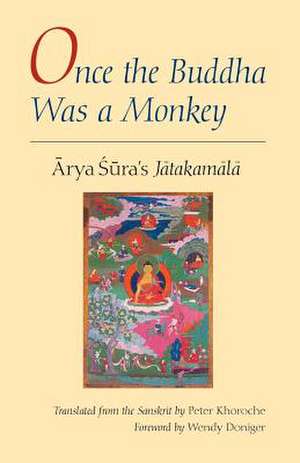Once the Buddha Was a Monkey: Arya Sura's "Jatakamala"
Autor Arya Sùra Traducere de Peter Khorocheen Limba Engleză Paperback – 14 sep 2006
Here is one of the most entertaining masterpieces of Sanskrit literature rendered in an English translation that fully captures the original's artistry and charm.
Written most probably in the fourth century A.D., the Jatakamala is generally considered the masterpiece of Buddhist literature in Sanskrit. In elegant, courtly style, Arya Sura retells thirty-four traditional stories about the Buddha in his previous incarnations, human and animal. Whether as a king, a brahmin, a monkey, or a hare, the Great One is shown in assiduous pursuit of virtue and compassion. Though primarily intended as exemplary tales illustrating the Buddhist virtues, these stories also provide a vivid picture of life at a high point in ancient Indian culture—city life in ordinary households or at the royal court, and country life against a backdrop of mountain, desert, and jungle.
Fresh study of the Sanskrit manuscripts, now scattered in libraries all over the world, has enabled Peter Khoroche to make this new translation faithful to the original in both style and content. His explanatory notes will assist student and general reader alike in appreciating this classic from an ancient and exotic civilization.
Written most probably in the fourth century A.D., the Jatakamala is generally considered the masterpiece of Buddhist literature in Sanskrit. In elegant, courtly style, Arya Sura retells thirty-four traditional stories about the Buddha in his previous incarnations, human and animal. Whether as a king, a brahmin, a monkey, or a hare, the Great One is shown in assiduous pursuit of virtue and compassion. Though primarily intended as exemplary tales illustrating the Buddhist virtues, these stories also provide a vivid picture of life at a high point in ancient Indian culture—city life in ordinary households or at the royal court, and country life against a backdrop of mountain, desert, and jungle.
Fresh study of the Sanskrit manuscripts, now scattered in libraries all over the world, has enabled Peter Khoroche to make this new translation faithful to the original in both style and content. His explanatory notes will assist student and general reader alike in appreciating this classic from an ancient and exotic civilization.
“The general reader will be highly grateful for this new translation which, besides being beautifully printed, is rounded off with a very informative and reliable introduction.”—Renate Söhnen-Thieme, Bulletin of the School of Oriental and African Studies
“One would be a fool not to welcome the chance to read this book.”—Richard Gombrich, Journal of the Royal Asiatic Society
“One would be a fool not to welcome the chance to read this book.”—Richard Gombrich, Journal of the Royal Asiatic Society
Preț: 287.83 lei
Nou
Puncte Express: 432
Preț estimativ în valută:
55.08€ • 57.16$ • 46.04£
55.08€ • 57.16$ • 46.04£
Carte tipărită la comandă
Livrare economică 17-31 martie
Preluare comenzi: 021 569.72.76
Specificații
ISBN-13: 9780226782157
ISBN-10: 0226782158
Pagini: 294
Dimensiuni: 140 x 216 x 25 mm
Greutate: 0.35 kg
Editura: University of Chicago Press
Colecția University of Chicago Press
ISBN-10: 0226782158
Pagini: 294
Dimensiuni: 140 x 216 x 25 mm
Greutate: 0.35 kg
Editura: University of Chicago Press
Colecția University of Chicago Press
Notă biografică
Peter Khoroche studied Sanskrit at Cambridge University and in Madras. He has taught at the School of Oriental and African Studies, University of London.
Cuprins
Foreword
Preface
Introduction
Prologue
1. The Tigress
2. Sibi
3. The Dumpling
4. The Merchant
5. Avisahya the Merchant
6. The Hare
7. Agastya
8. Maitribala
9. Visvamtara
10. The Sacrifice
11. Sakra
12. The Brahmin
13. Unmadayanti
14. Suparaga
15. The Lord of the Fish
16. The Young Quail
17. The Jar Full of Spirits
18. The Man without an Heir
19. The Lotus Stalks
20. The Royal Treasurer
21. Bodhi
22. The King of the Geese
23. Bodhi the Wandering Ascetic
24. The Great Ape
25. The Ibex
26. The Antelope
27. The King of the Monkeys
28. Ksantivadin
29. The Inhabitant of Highest Heaven
30. The Elephant
31. Sutasoma
32. Ayogrha, the Prince in the Iron House
33. The Buffalo
34. The Woodpecker
Abbreviations
Notes
Bibliography
Preface
Introduction
Prologue
1. The Tigress
2. Sibi
3. The Dumpling
4. The Merchant
5. Avisahya the Merchant
6. The Hare
7. Agastya
8. Maitribala
9. Visvamtara
10. The Sacrifice
11. Sakra
12. The Brahmin
13. Unmadayanti
14. Suparaga
15. The Lord of the Fish
16. The Young Quail
17. The Jar Full of Spirits
18. The Man without an Heir
19. The Lotus Stalks
20. The Royal Treasurer
21. Bodhi
22. The King of the Geese
23. Bodhi the Wandering Ascetic
24. The Great Ape
25. The Ibex
26. The Antelope
27. The King of the Monkeys
28. Ksantivadin
29. The Inhabitant of Highest Heaven
30. The Elephant
31. Sutasoma
32. Ayogrha, the Prince in the Iron House
33. The Buffalo
34. The Woodpecker
Abbreviations
Notes
Bibliography
